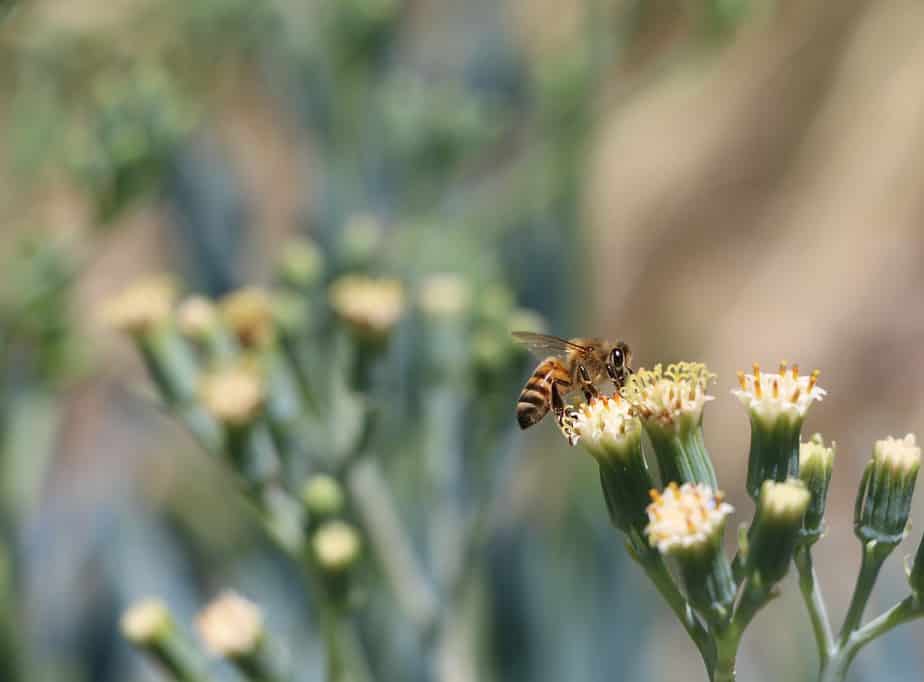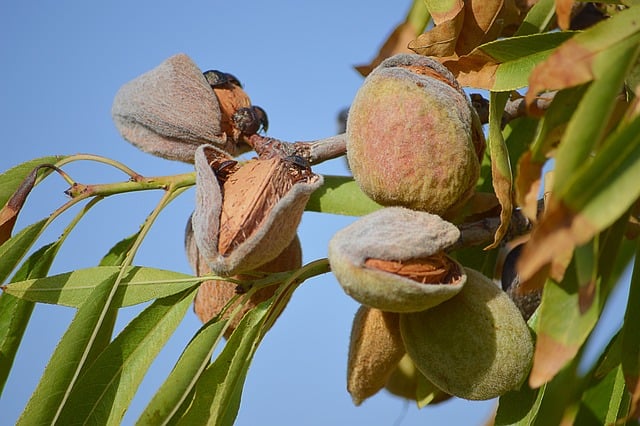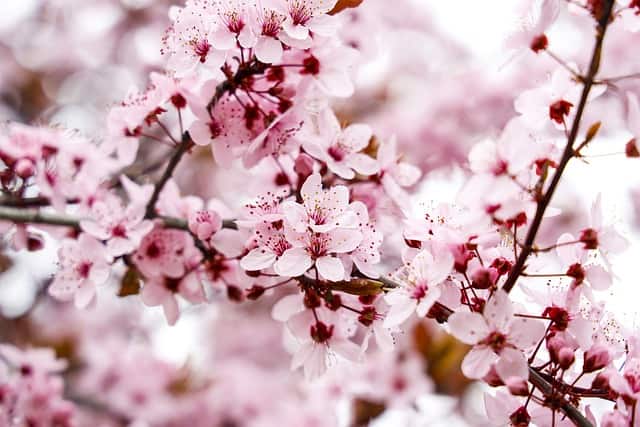The Almond Alliance of California is a non-profit trade association established in 1980. Headed by Aubrey Bettencourt as the President and CEO, the Alliance advocates for and protects the interests of the almond industry. The Alliance provides its members with a forum to network and access the latest information and technology. Their network includes almond processors, hullers/shellers, growers, and allied businesses. In addition to member support, the Alliance also works closely with local, state, and federal governmental organizations on behalf of the almond industry.
Bettencourt gave a talk at this year’s Almond Convention, discussing the industry’s challenges and what to expect in 2023. The ongoing fight to exclude four species of bees from the California Endangered Species Act took center stage.

Bees As An Essential Part Of Almond Farming
Pollinators help ecosystems and agriculture thrive by transferring pollen from one flower to another. This allows plants to reproduce and create seeds, fruits, and vegetables. Without pollinators, many plants would struggle to produce and eventually die. Bees are vital pollinators in California, especially for almonds. Almonds are a major agricultural crop in California, and bees are crucial for pollinating almond trees. Almond trees need cross-pollination with other almond trees to produce almonds.
Bees aren’t the only pollinators contributing to almond production in California, but they’re the most efficient and cost-effective. According to the Almond Board of California, one colony of bees can pollinate up to two acres of almond trees.
Recently, the number of bees in California has decreased, which has caused concerns about the potential impact on the almond industry. The petition to list four species of bees as endangered under the California Endangered Species Act (CESA) aims to protect and conserve these essential pollinators and ensure the ongoing production of almonds in California.

Bees As An Endangered Species
Recently, the California Fish and Game Commission petitioned to list four species of bees as endangered under the California Endangered Species Act (CESA). CESA is a state law that protects threatened and endangered species in California. The California Department of Fish and Wildlife and the Fish and Game Commission administers CESA.
In 2022, the Almond Alliance and other commodity organizations filed a lawsuit quickly to halt the petition from being considered. They argued that the California Endangered Species Act (CESA) doesn’t explicitly protect insects and, therefore, cannot include bees. Despite their efforts, the state Supreme Court ruled that California bees are protected under the law.

The decision to list four species of bees as endangered under the California Endangered Species Act (CESA) was based on the fact that bees technically fall under the definition of “fish” in CESA. While this may seem strange, CESA specifies that all terrestrial invertebrates, including bees, are considered “fish,” along with Pacific Ocean slugs and mollusks. This oddity can be attributed to the outdated nature of CESA. In any case, the Third District Court of Appeal upheld this law interpretation in the Almond Alliance of California v. Fish & Game Com. (2022).
The Court found that the Fish and Game Commission did not exceed its statutory authority under CESA when it designated the bees as candidate species for consideration under the Act. Proponents of the inclusion of bees under CESA state it is significant because it allows for the protection and conservation of these essential pollinators, which play a crucial role in the ecosystem and agriculture in California.
The Effect On Farmers With The California Endangered Species Act

This decision will have significant effects on the state’s agriculture industry. The ruling allows many types of insects to be considered endangered species. The Almond Alliance is worried about this decision because they protect pollinators and their homes. According to their case, California has the most bee-friendly land per person. Aubrey Bettencourt says, “No one had to make us do that. It’s part of how we do business. We have been doing the right thing.”
There are also many challenges to carrying out this new policy change. Millions of bees live on almond farms, and many more come to the state to pollinate each year. It is almost impossible to know the type of bees without harming or bothering them. This can lead to almond farmers breaking the law while trying to follow it. Given the high nutritional value of almonds, the last thing we want to do is make life harder for almond farmers.
Farmers Become The Threat

Those in the industry are concerned that listing bees as an endangered species could destroy almond-growing acres. This concern is based on the idea that protecting bees and their habitats may require conserving land used for almond production. If bees are listed as endangered, the use of this land may be subject to stricter regulations or requirements. These more stringent regulations could potentially destroy almond-growing acres and undermine current efforts to protect pollinators and their habitats within the industry.
The Almond Alliance is pursuing a Candidate Conservation Agreement with Assurances (CCAA) to address this concern. With the federal government’s help, the Almond Alliance can work to conserve bees and their habitats while also allowing for the continuation of almond production if they are successful with the CCAA.
The Almond Alliance Pursues A Candidate Conservation Agreement With Assurances
Authorized by the Endangered Species Act, a CCAA is a voluntary conservation agreement that addresses the conservation needs of at-risk species. This is designed to help these at-risk animals before they are listed as endangered or threatened. Bettencourt hopes the government will recognize the almond industry’s efforts not to cause harm to bees. The position of the Almond Alliance is that the industry has been a collective good actor in protecting pollinators and their habitats.’
The Almond Alliance is working to save California Farmers from requiring the classification of each bee used for pollination. As stated, the almond industry has been a collective good actor in protecting pollinators and their habitats. Watching the bees has been a mutually beneficial relationship with the farmers for centuries. The position of the Alliance is that this should hold weight in the eyes of the federal government. The Almond Alliance, with the industry at large, has a proven track record of actively working to develop more sustainable practices. California almond farmers have actively been working to evolve with a rapidly changing global climate.
Taking Action With The Almond Board Of California

Organizations such as the Almond Board Of California are crucial to success. The Almond Board of California significantly impacts the almond industry with its collaboration. The Almond Board has a global network, an understanding of the market, and a history of valuable research. Significantly, critical decisions will have formulation from this data. This historical research often finds use to create policy action, and the Almond Board helps to maximize the benefit. The Almond Board can advocate for the almond industry by collaborating with other organizations. They are supporting growth and success.
The Almond Alliance Taking Action
Once passed, the upcoming 2023 Farm Bill will have great significance for the almond industry. Bettencourt expressed doubt regarding the speed at which it is progressing. Once passed, the Farm Bill will support almond farmers, helping protect America’s agricultural land from development. This ensures that farmers and landowners have the necessary resources to safeguard their land. It also supports farmers and ranchers operating successful businesses while providing their communities nutritious food. In addition, the Farm Bill recognizes and rewards farmers and ranchers for the environmental benefits they provide. Finally, it helps to ensure that a diverse new generation of farmers can afford to buy farmland and build wealth. The Almond Alliance will closely monitor the Farm Bill and engage with politicians and lobbyists to support the interests of the almond industry.
The Almond Alliance always accepts new members and encourages all growers, hullers, and shellers to join. As a member of the Alliance, you will receive access to their full range of resources. This includes direct help with signing up and qualifying for aid programs and grants, resolving compliance issues on farms, and even access to attorneys.
Aubrey Bettencourt and the Almond Alliance have consistently fought tooth and nail for almond farmers. Showing a commitment to continuing their fight into 2023 and beyond and hope you will join them.

Words By Aubrey Bettencourt.
Writing By Sophia Merritt And Matthew Baron.


